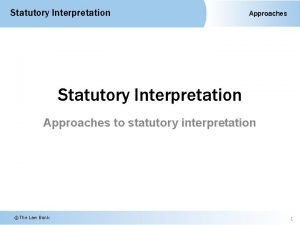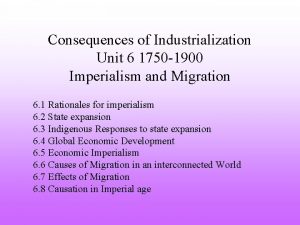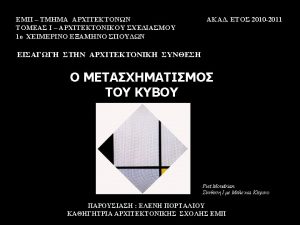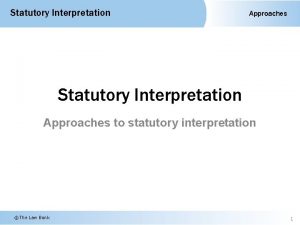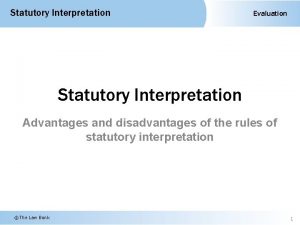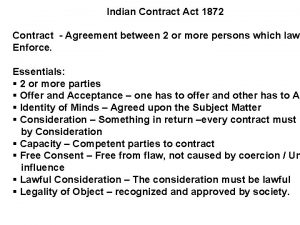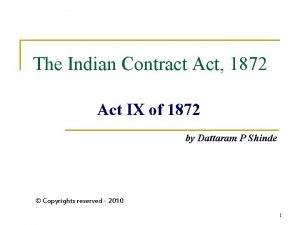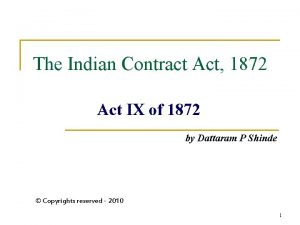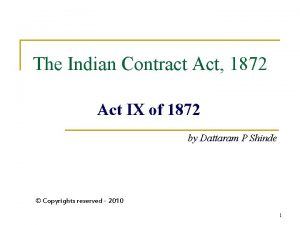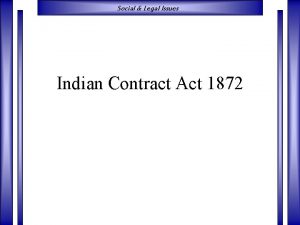INDIAN CONTRACT ACT 1872 DISCHARGE OF CONTRACT Discharge


















- Slides: 18

INDIAN CONTRACT ACT, 1872 DISCHARGE OF CONTRACT

Discharge of Contract • What is Discharge of Contract? “When an agreement, which was binding on the parties to it, ceases to bind them, the contact is said to be discharged”. • Discharge means the termination of a contractual obligation on Court orders, mutual agreement, or caused by breach of contract, Frustration of Contract or performance of Contract • A contract may be discharged in the following ways: 1. By Performance of the contract ; 2. By breach of the contract ; 3. By impossibility of performance ; 4. By Agreement. 5. By operation of law

Discharge of Contract 1. Discharge by performance: Under a contract each party is bound to perform his part of the obligation. After the parties have made due performance of the contract, their liability under the contract comes to an end. In such a case the contract is said to be discharged by performance. 2. Discharge by breach of Contract: When a party having a duty to perform a contract fails to do that, or does an act whereby the performance of the contract by him becomes impossible, or he refuses to perform the contract, there is said to be a breach of contract on his part.

Discharge of Contract • On the breach of contract by one party, the other party is discharged from his obligation to perform his part of the obligation, and he also gets a right to sue the party making the breach of contract for damages for the loss occasioned to him due to the breach of contract. • The breach of contract may be either 1. Actual, i. e. , non-performance of the contract on the due date of performance, or 2. Anticipatory, i. e. , before the due date of performance has come. • For example, A is to supply certain goods to B on 1 st January. On 1 st January A does not supply the goods. He has made actual breach of contract. On the other hand, if A informs B on 1 st December that he will not perform the contract on 1 st January, A has made anticipatory breach of contract

Discharge of Contract • Anticipatory breach of Contract: It means the repudiation of a contract by one party to it before the due date of its performance has arrived. • Section 39, which contains law relating to anticipatory breach of contract is as follows: • “ When a party to a contract has refused to perform, or disabled himself from performing, his promise in its entirety, the promisee may put an end to the contract, unless he has signified, by words or conduct, his acquiescence in its continuance. ” • Anticipatory breach of contract could be made by promisor, either by refusing to perform the contract, or disabling himself from performing the contract in its entirety, before the due date of performance has arrived. When the refusal to perform the contract in its entirety is not there, it should not be considered as a case of anticipatory breach within the meaning of section 39.

Discharge of Contract ü In West Bengal Financial Corporation Vs. Gluco Series (AIR 1973 Cal). , ‘A’ granted a loan to ‘B’ amounting to Rs. 4, 38, 000 and also agreed to grant a further loan of Rs. 1, 62, 000 at its discretion, provided that B made the repayment of the loan in accordance with the agreement at the rate of Rs. 60, 000 every year. B failed to make the repayment as agreed. B insisted that A should grant further loan of Rs. 1, 62, 000 to him, but A did not grant further loan because B did not make the repayment of loan as agreed. B’s contention was that A had failed to perform the contract by not advancing further loan, which should be considered to be breach of contract. It was, however, held that A had already advanced some loan, which B had accepted, there cannot be said to be a refusal on A’s part to performance of the contract in its entirety. B was therefore not entitled to put an end to the contract on the ground of breach of contract on the part of A.

Discharge of Contract • Illustration: A, a singer, enters into a contract with B , the manager of a theatre to sing at his theatre two nights in every week during two upcoming months, and B agrees to pay her 10000 rupees for each night’s performance. On the sixth night A wilfully absents herself from theatre. B is at liberty to put an end to the contract. • The above illustration to section 39 may create a misapprehension that in this case absenting on one of the nights is only partial refusal to perform the contract and not failure to perform the contract in its entirety.

Discharge of Contract 3. Discharge by Impossibility to perform: Both under the English and Indian law in a contract, if performance of which is impossible the same is void for that reason. Section 56, which deals with this question, mentions two kinds of impossibility. • Firstly, impossibility existing at the time of the making of the contract. • Secondly, a contract which is possible of performance and lawful when made, but the same becomes impossible or unlawful thereafter due to some supervening event.

Discharge of Contract a. Initial impossibility: An agreement to do an act impossible in itself is void. The object of making any contract is that the parties to it would perform their respective promises. If a contract is impossible of being performed. , the parties to it will never be able to fulfil their object, and hence such an agreement is void. • For example, A agrees with B to discover treasure by magic. The performance of the agreement being impossible, the agreement is void. Similarly, an agreement to bring a dead man to life is also void.

Discharge of contract b) Subsequent Impossibility: The performance of the contract may be possible when the contract is entered into but because of some event, which the promisor could not prevent, the performance may become impossible or unlawful. Section 56 makes the following provision regarding the validity of such contracts : “A contract to do an act which after the contract is made, becomes impossible, or by reason of some event which the promisor could not prevent, unlawful, becomes void when the act, becomes impossible or unlawful. ”

Discharge of contract • A and B contract to marry each other. Before the time fixed for marriage, A goes mad. The contract becomes void. • A Contracts to take in cargo for B at a foreign port. A’s Government afterwards declares war against the country in which the port is situated. The contract becomes void when war is declared. • A contracts to act at a theatre for six months in consideration of a sum paid in advance by B. On several occasions A is too ill to act. The contract to act on those occasions becomes void.

Discharge of Contracts 4. Discharge by Agreement /Novation • Section 62 and 63 deals with contracts in which the obligation of the parties to it may end by consent of the parties. • Novation: Novation means substitution of an existing contract with a new one. When, by an agreement between the parties to a contract, a new contract replaces an existing one, the already existing contract is thereby discharged, and in its pace the obligation of the parties in respect of the new contract comes into existence.

Discharge of Contract • Effect of Novation, Recession and alteration of Contract • If the parties to a contract agree to substitute a new contract for it or rescind or alter it, then original contract need not be performed, ” • Novation is of two kinds : i. Novation by change in the terms of the contract; ii. Novation by change in the parties to the contract

Discharge of Contract I. Change in terms of the contract: Then parties to a contract are free to alter the contract which they had originally entered into. If they do so, their liability as regards the original agreement is extinguished, and in its place they become bound by the new altered agreement. • For example, A owes B 10, 000 rupees. A gives a bond that he will repay the debt by paying RS. 1000/- every month. Later A enters into an agreement with B , and gives B a mortgage of his (A’s) estate for 5, 000 rupees in place of the debt of 10, 000 rupees. This is a new contract and extinguishes the old. In this illustration the parties to the contract remain the same but there is a substitution of a new contract with altered terms in place of the old one. It may be noted that novation is valid when both the parties agree to it.

Discharge of Contract II. Change in Parties of the Contract: It is possible that by novation an obligation may be created for one party in place of another. If under an existing contract A is bound to perform the contract in favour of B , the responsibility of A is bound to perform the contract in favour of B, the responsibility of A could be taken over by C. Now instead of A being liable towards B, by novation C becomes liable towards B. For example, A owes money to B under a contract. It is agreed between A, B and C that B shall henceforth accept C as his debtor, instead of A. The old debt of A to B is at end and new debt from C to B has been contracted. • It may be noted here that in such cases there should be consent of all the three persons, viz. , the person who wants to be discharged from the liability, the person who undertakes to be liable in place of the person discharged, and the person in whose favour the performance of the contract is be liable to be made. Thus, if A and B agree that in place of A, now C will be liable, but C does not consent to it, there would be no novation.

Discharge of Contract v. The working of the doctrine of novation has been explained by Lord Selborne in Scarf Vs. Jardine in the following words: “That, there being a contract in existence, some new contract is substituted for it either between the same parties or between different parties, the consideration mutually being the discharge of the old contract. A common instance of it in partnership cases is where upon the dissolution of a partnership the person who are going to continue in business agree and undertake as between themselves and the retiring partner, that they will assume and discharge the whole liabilities of the business, usually taking over the assets and if, in that case, they give notice of that arrangement to a creditor, and ask for his accession to it, there becomes a contract between the creditor who accedes and the new firm to the effect that he will accept their liability instead of the old liability, and on the other hand, that they promise to pay him that consideration. ”.

Discharge of Contract 5. By operation of Law • A contract is discharged or terminated by operation of other laws in the following cases: 1. Merger implies coinciding and meeting of an inferior and superior right on one and the same person. In such a case inferior right available to a party under an agreement will automatically vanish. Example: A is holding a property under lease. He subsequently buys that property. A’s right as a tenant is inferior to his right as an owner of the property. 2. Death: In case a contract is of a personal nature, the death of the promisor will discharge the contract. In other cases, the rights and liabilities of the deceased person shall pass to his legal representatives. 3. By complete loss of evidence of the existence of the contract. 4. By insolvency. An insolvent is released from performing his part of the contract by law. Order of discharge, however gives a new lease of life to the insolvent and he is discharged from all obligations arising from all his earlier contracts

Thank you
 Indian contract act 1872
Indian contract act 1872 Nature of contract
Nature of contract Item rate contract
Item rate contract Section 2 d consideration
Section 2 d consideration Chapter 5 lesson 1 the imperialist vision answers
Chapter 5 lesson 1 the imperialist vision answers R v allen (1872)
R v allen (1872) American progress by john gast 1872
American progress by john gast 1872 De stijl bauhaus
De stijl bauhaus Claude monet impresia
Claude monet impresia Official publication of propaganda movement
Official publication of propaganda movement Becoming a world power, 1872–1917
Becoming a world power, 1872–1917 Openshaft
Openshaft Open-shaft diamond mining at kimberley south africa in 1872
Open-shaft diamond mining at kimberley south africa in 1872 Poder judicial
Poder judicial Aeroplane flying
Aeroplane flying R v allen (1872) lr 1 ccr 367
R v allen (1872) lr 1 ccr 367 Nathaniel alexander folding chair
Nathaniel alexander folding chair Purposive approach advantages and disadvantages
Purposive approach advantages and disadvantages ブロードウェイブギウギ
ブロードウェイブギウギ





